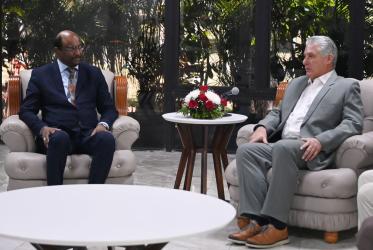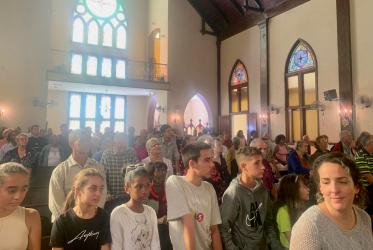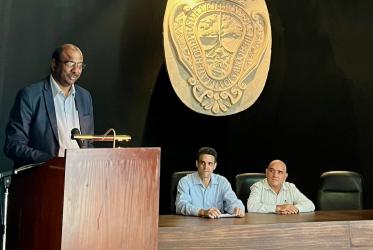They acknowledged the gift of the Barbados Gospelfest in May, which expressed churches’ affirmation and celebration of persons with disabilities in musical and other creative ways.
The Gospelfest was an opportunity to reintroduce and highlight the witness and work of the WCC within the Barbadian ecumenical community.
As part of the Barbados Gospelfest, Caribbean co-coordinator of the WCC Ecumenical Disability Advocates Network Rev. Dr Gordon Cowans offered a public lecture on 22 May, exploring the theme “Touching Lives of Persons With Disability: Freed to Simply Be.”
Cowans described the Gospelfest as “a wonderful model of expressing the goodness of God in the world through music,” expressing gratitude to the festival’s organizers.
“You know, marginalized people in the world are sometimes referred to as the voiceless, and perhaps there are more people who are not voiceless so much as we are not listening,” he said during his lecture.
UN country reviews
Participants were urged to encourage their churches to share information on pending UN-related country reviews. The UN benefits from civil society responses to these interventions as they often reflect the reality in location.
Racial justice
The group also highlighted the ongoing work and representation of people from the Caribbean in addressing racism, and particularly offering mutual support to the WCC’s Overcoming Racism programme. Reference was also made to the current work of Caribbean churches in the British reparations conversation.
Cuba’s current designation
At the request of Rev. Liudmila Hernandes, the group also discussed the injustice of Cuba's current designation as a country sponsor of terrorism, considering a statement from churches there. “For the past sixty years, Cuba has been subject to an economic embargo,” reads the statement. “This pressure has been compounded since 2017 by 243 additional sanctions and the inclusion of Cuba on the list of state sponsors of terrorism.”
One of the arguments used to consider Cuba as a country sponsor of terrorism was that, as the host country of the dialogues or conversations to achieve Peace in Colombia, Cuba would not hand over the negotiators of the National Liberation Army.
“This label is more than words; it is a crippling restriction that prevents the Cuban people from accessing vital resources, hinders their development and causes great generational hardship,” reads the statement. “This reality could be alleviated by changes in US policy.”
The Caribbean group also focused on strategic priorities for the meeting of the central committee, including representation on commissions, youth advisors, and the current impasse of gang violence in Haiti.






